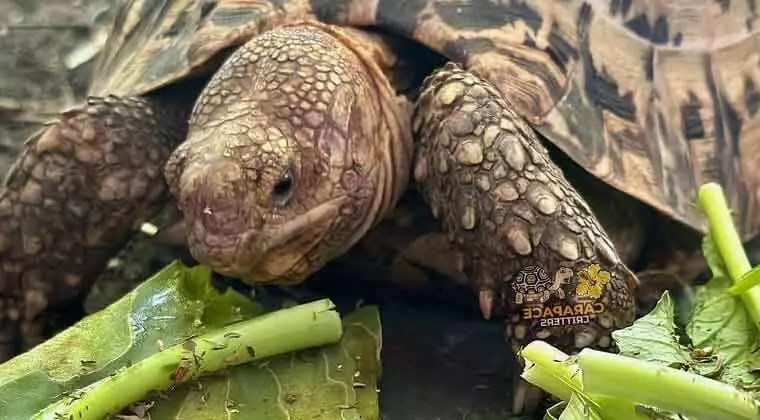Yes, tortoises can eat spinach. Spinach is a good source of vitamins A, B2, C, and K as well as minerals like calcium and iron. It also contains dietary fiber which helps to maintain intestinal health in tortoises.
In addition to these benefits, spinach also provides essential fatty acids that are important for the growth and development of a healthy shell in many species of tortoise. However, when feeding your pet turtle or tortoise spinach it should be offered in moderation since it contains oxalic acid which can cause problems if consumed in large quantities over an extended period of time.
Tortoises can indeed eat spinach, and it’s actually a great source of vitamins and minerals for them. Spinach is high in calcium, which helps strengthen tortoise shells and bones. Additionally, it contains beta-carotene, an antioxidant that helps boost their immune system health.
While spinach should never make up more than 10 percent of a tortoise’s diet, adding these leafy greens to their regular food can help ensure your pet stays healthy and happy!
What Can Tortoises Eat?
Tortoises are herbivorous animals that primarily eat leafy greens and vegetables, including grasses, weeds, dark green lettuce, and other leafy vegetation. They need a balanced diet that includes calcium for strong bones and shells.
It is also important to provide a variety of foods so they don’t get bored with their meals. Other suitable foods include squash, carrots, sweet potatoes, broccoli stems, and occasional treats like fruits or melon rinds.
What Leafy Greens Can My Tortoise Eat?
Leafy greens are a vital part of any tortoise’s diet, as they provide essential vitamins and minerals that help promote healthy growth. Fortunately, there is a wide variety of leafy greens that your tortoise can enjoy. Some of the most popular choices include dandelion leaves, endive, escarole, chicory greens, kale, collard greens, mustard greens, and turnip tops.
Other nutritious options include romaine lettuce (without any added dressings or seasonings), spinach, and opuntia cactus pads (also known as prickly pear). Be sure to always wash these items before feeding them to your pet tortoise to remove dirt and potential contaminants.
Additionally, it’s important not to feed too much kale or other cruciferous vegetables as an excess may cause bloating in some species due to their high calcium content. It’s best if you offer variety when it comes to leafy greens for your reptile companion so make sure you incorporate different kinds into his meals!
Can You Feed Spinach to Sulcata Tortoise?
Yes, you can feed spinach to a sulcata tortoise. In fact, it is one of the most important foods to include in their diet as they are high in essential vitamins and minerals like Vitamin A and calcium which are both beneficial for your tortoises’ health. Spinach should be fed no more than two or three times per week because too much vitamin A can actually lead to issues with shell development.
When feeding your sulcata spinach, make sure that you only give them fresh leaves that have been properly washed since any chemicals or bacteria from the soil could cause digestive problems if ingested by your turtle. Additionally, always remove any uneaten food items from their enclosure after about an hour so that it does not spoil and potentially harm them.
Can Desert Tortoises Eat Spinach?
Yes, desert tortoises can eat spinach as part of their diet. Spinach is a nutritious vegetable that provides the tortoise with vitamins A, B, and E as well as calcium and magnesium. It also contains essential minerals such as iron, zinc, phosphorus, and copper.
When feeding your desert tortoise spinach it should always be fresh or frozen and never canned because it contains too much salt which can harm your pet. While providing important nutrients to help keep your pet healthy; spinach should not be the only food source given to them but rather one of many vegetables they receive in their regular diet along with other items like hay or grasses.
As with any type of food you offer your desert tortoise it’s best to introduce new foods slowly so that they can get used to its taste before eating larger amounts.
What Should I Not Feed My Tortoise?
There are a few things that you should never feed your tortoise. While there is no one-size-fits-all answer, as the species of tortoises vary and their nutritional needs differ, it’s important to understand what not to give them in order to keep them healthy.
Generally, you should avoid feeding your tortoise any kind of processed food like canned or prepared salads or vegetables, as these contain too much salt and sugar for their delicate digestive systems. You also want to stay away from anything sweet like fruit or candy a little bit can be okay but it shouldn’t make up a large portion of their diet. Additionally, while some people think that insects like mealworms make great treats for turtles and tortoises alike, they are actually high in fat content so they’re best avoided altogether.
Lastly, try not to give your reptile pet any animal proteins such as beef or chicken; these tend to be far too rich for herbivorous animals such as reptiles. Instead, stick with leafy greens like kale and collard greens which will provide all the nutrients they need without putting excessive strain on their sensitive stomachs!
Tortoise Eating Spinach and Watercress Eating Sounds ASMR
Conclusion
Spinach can be a healthy and nutritious part of a tortoise’s diet. Spinach is high in fiber, vitamins, minerals, and antioxidants that are beneficial for their health. However, it should always be given to them in moderation with other vegetables as their primary source of nutrition.
Tortoises should never solely rely on spinach as their main food source. If you have any doubts or questions about your tortoise’s diet consult an experienced vet before making any dietary changes.
